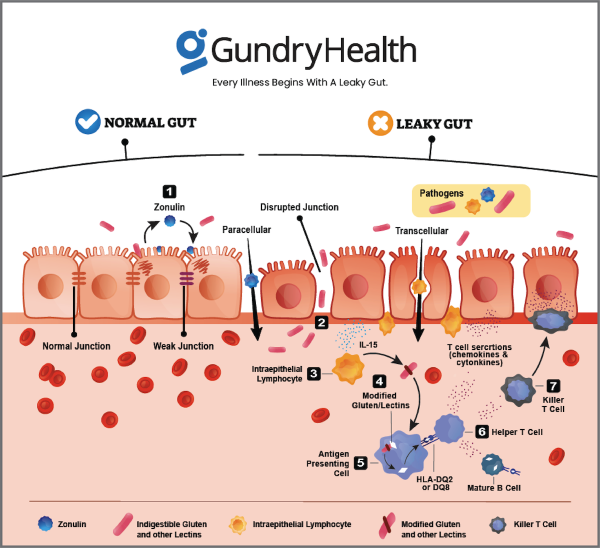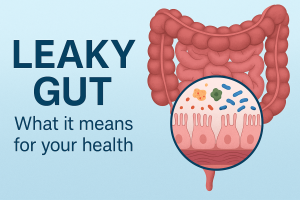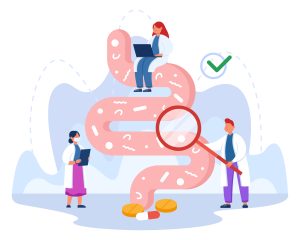Unraveling the Connection: Erythema Nodosum and its Origins in the Gut
Thousands of patients experience a red, painful, and tender lump on their skin every year. This lump can lead to inflammation and pain, and can sometimes indicate the presence of an underlying autoimmune disease and can cause a disease called erythema nodosum (EN). This disease affects the fat cells beneath the skin and can be triggered by multiple factors.
Erythema nodosum and Autoimmune Disease Connection
Erythema nodosum (EN) is a rare and severe skin disorder that causes red, painful, and swollen lumps on your skin, usually on your shins. These lumps can indicate that the immune system is compromised and an autoimmune disease is triggered. This means that the immune system is mistakenly attacking healthy tissues and organs. EN can affect your quality of life, making it hard to walk, run, or perform simple daily tasks.
EN Cause and Leaky Gut Syndrome Connection
EN and leaky gut syndrome are connected in several ways. EN itself causes inflammation in your skin, which may be caused due to damage in your gut lining (leaky gut syndrome). The disease can interfere with your hormonal balance, which can affect your gut health as well. For instance, estrogen deficiency (having too little estrogen relative to progesterone) can increase intestinal permeability and promote the growth of bad bacteria in your gut.
EN can also affect your diet and lifestyle choices, which can also impact your gut health. For example, many people with EN experience pain during or after eating certain foods, such as lectins (a type of protein found in many plant foods), dairy products (milk), soy products (tofu), red meat (beef), sugar (candy), caffeine (coffee), alcohol (wine), or spicy foods (chili). These foods can also cause or worsen leaky gut syndrome by irritating your gut lining or feeding the bad bacteria in your gut.
Causes
There are different causes of EN, and in some cases, the cause may not be known. However, in some people, certain underlying conditions, infections, and medications can trigger EN. Some of the underlying conditions that can trigger EN include inflammatory bowel diseases, sarcoidosis, and leukemia. Some infections such as tuberculosis, strep throat, fungal infections, and viral infections like hepatitis can also trigger EN. Certain medications like sulfa drugs and birth control pills have also been known to cause EN.
Furthermore, many people with EN resort to medications or surgeries to manage their symptoms or improve their skin appearance. However, these treatments can also have negative effects on your gut health. For example,
- Nonsteroidal anti-inflammatory drugs (NSAIDs), such as aspirin or ibuprofen, can reduce inflammation and pain in the short term but can also damage your gut lining and increase intestinal permeability in the long term.
- Corticosteroids or immunosuppressants can suppress inflammation and immune activity but can also wipe out the good bacteria in your gut and create an imbalance in your gut microbiome (the community of beneficial bacteria in your gut).
- Antibiotics can kill off infections but can also destroy the good bacteria in your gut and increase the risk of fungal overgrowth or antibiotic-resistant bacteria.
- Surgeries such as liposuction or skin grafting can remove fat cells or skin lesions but can also cause trauma to your intestines or introduce infections into your abdominal cavity.
How To Diagnose and Treat EN and Leaky Gut Syndrome?
EN can be difficult to diagnose, as they can cause a variety of symptoms that can be mistaken for other conditions. To make a diagnosis, your doctor will need to take a detailed medical history, perform a physical examination, and order some tests to confirm your condition. These tests may include:
- Blood tests to check for inflammation, hormones, antibodies, or infections
- Urine tests to check for toxins or infections
- Stool tests to check for parasites, bacteria, or yeast
- Breath tests to check for bacterial overgrowth or food intolerances
- Skin biopsy to check for EN lesions or inflammation
Diagnosis
To diagnose erythema nodosum (EN), your healthcare provider will examine your lumps to determine whether they fit the characteristics of EN. Additionally, your healthcare provider may also suggest a physical examination, a skin biopsy, and a blood test to test for signs of bacterial or fungal infection, autoimmune disorders, or other underlying conditions that could be contributing to the EN.
The treatment of EN and leaky gut syndrome depends on the severity and cause of your condition. Some of the possible treatments include:
- Medications or supplements to reduce inflammation, regulate hormones, balance gut bacteria, or heal the gut lining
- Dietary changes to eliminate foods that cause leaky gut syndrome or EN symptoms and to include foods that support gut health and skin health
- Lifestyle changes to reduce stress, improve sleep, exercise moderately, and avoid toxins or infections
- Alternative therapies such as acupuncture, massage, yoga, meditation, or herbal remedies to relieve pain, inflammation, or stress
- Surgery to remove fat cells or skin lesions if medications or other treatments fail or if skin appearance is severely impaired
How To Prevent or Heal EN and Leaky Gut Syndrome with Diet and Lifestyle Changes?
While some forms of EN and leaky gut syndrome are not preventable, you can still take steps to improve your overall health and reduce your risk of complications. Some of the best ways to do so are:
- Eat a balanced diet that is rich in plant-based foods, healthy fats, and lean proteins. Avoid foods that are high in sugar, refined carbs, lectins, gluten, dairy, soy, corn, and nightshades. These foods can trigger inflammation, disrupt your gut microbiome, and impair your immune system2
- Drink plenty of water and stay hydrated throughout the day. Dehydration can worsen your symptoms and affect your blood volume and pressure.
- Avoid alcohol, caffeine, nicotine, and drugs that can interfere with your gut function. These substances can cause dehydration, increase your heart rate and blood pressure, and affect your mood and sleep quality.
- Manage your stress levels and practice relaxation techniques. Stress can activate your sympathetic nervous system (the fight-or-flight response) and cause a surge of adrenaline and cortisol. This can exacerbate your symptoms and damage your nerves over time.
- Get enough sleep and follow a regular sleep schedule. Sleep is essential for repairing your body and regulating your hormones. Lack of sleep can impair your cognitive function, mood, metabolism, and immune system.
- Exercise moderately and regularly but avoid overexertion or extreme temperatures. Exercise can improve your cardiovascular health, muscle tone, blood flow, and mood. However, too much exercise or exposure to heat or cold can trigger your symptoms and cause a drop or spike in your blood pressure or heart rate.
Treatment
There is no specific cure for erythema nodosum, but there are treatment options that can help alleviate symptoms and heal faster. Treatment is typically focused on treating the underlying condition that caused EN. For example, if EN is caused by an infection, antibiotics or antifungal medication may be prescribed. If it’s caused by an inflammatory disorder such as inflammatory bowel disease, medications called corticosteroids may be prescribed. Additionally, over-the-counter treatments such as ibuprofen, and acetaminophen can help alleviate pain and inflammation. Rest and avoiding long periods of standing can also help reduce swelling.
EN is more than just a skin issue – it’s a disease that like most other diseases starts in the gut. Understanding this connection is crucial for finding effective treatment options that address the full scope of your health. By advocating for comprehensive and individualized care, you can take control of your health and improve your overall well-being.
Get personalized care and recommendations for Erythema nodosum from Dr Gundry-Approved program
If you’re looking for more guidance about Erythema nodosum disease than this short list of recommendations, Dr. Gundry’s unique health program is now available to you (without needing an appointment at one of Dr. Gundry’s two, waitlist-only West Coast clinics).
Thanks to the pioneering work of Dr. Gundry and his team at Gundry Health, patient care team trained in Dr. Gundry’s unique holistic methods are now available to help you craft your own personalized Erythema nodosum program.
It’s easy to get started.
Simply click the link below to get more information about personalized Erythema nodosum treatment plan options, so you can get expert analysis, diagnostic care, and a plan for tackling lupus, arthritis, or other autoimmune diseases.
Each patient care team member at Gundry Health is Board Certified and trained in Dr. Gundry’s renowned approach to functional medicine and care.
Get your personal lab data and talk to a U.S. licensed doctor. Click Here.







